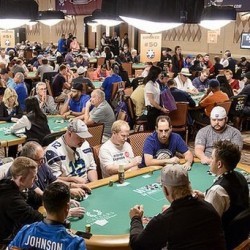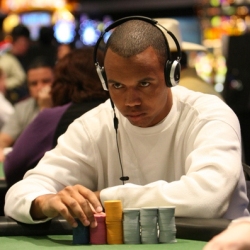How Wounded is the Poker Industry?

Is poker gravely wounded and getting ready to draw its final breath? Some analysts and media outlets who follow the gambling industry say so, and continue to perpetuate the idea that poker is declining and on its way out. While it’s true that there has been a drop in poker’s popularity since the poker boom came to an end in 2006, when you consider the history of poker, it becomes evident that poker isn’t mortally wounded. Instead, it has more or less suffered from a sprain from which it can recover, and in the meantime analysts should reset their expectations to the new reality accordingly.
The Current Statistics
If you look at where poker was in 2009 compared to where it was at the end of 2015, you can see where concern over the current state of the game has originated. In 2009, there were 114 poker rooms in Nevada and 913 poker tables in the state, which generated total revenue of $145.58 million. The 2015 numbers in comparison, however, are abysmal with Nevada home to just 76 poker rooms and 681 total tables, and total revenue down to $118.02 million.
Looking at the Full Picture
Comparing 2015’s numbers with the data from 2007 to 2009 is discouraging, but when you remove the years between 2005 and 2012 from consideration, the picture becomes very different. In 1992, there were only 92 poker rooms in Las Vegas with 564 total tables generating just $74.7 million in revenue. In 2002, the numbers were even lower with 57 rooms, 386 tables and $57.791 million of revenues generated. By adding the data from 2012 to 2015 to that, you can see that poker is moving in a positive direction.
The period from 2005 to 2012 is held up as the gold standard by those who study the poker industry. They point to the time as the peak of poker and say that everything that has come since has been a decline, but it’s more accurate to say that the huge poker boom that occurred during those 7 years happened because a number of conditions came together at just the right time. It was something out of the ordinary, something that likely will never happen again. Now that the industry has returned to “normal,” comparing its performance to that time of unusual interest in the game isn’t productive or helpful.
Resetting Expectations
Anyone waiting for poker to return to its 2005 to 2012 grandeur is likely going to be waiting forever, and continuing to measure poker by the standards set during those boom years is only ever going to paint a dismal picture of the industry. Players, media and operators need to stop wishing for the glory days to return but instead focus on the real data. Overall, poker play has increased from where it was in the late 90s.
While recently poker has been stunted, it can still rebound and move on to continue with a reasonably paced upward trend, but it won’t if people are continually saying that poker is dying and discouraging people from wasting their time playing. Expectations need to be reset. Once that happens, poker stands a real chance of recovery.
China The Next Poker Boom
In the meantime, China is being touted as the next market where poker is likely to experience an exponential level of growth. In 2014, the huge country of 1.35 billion people featured prominently in news articles after the Asia Pacific Poker Tour (AAPT) together with PokerStars sponsored the first major poker tournament series to take place in China, called the Beijing Millions. The series proved such a success that it subsequently set a record for being the largest tournament ever held outside of the USA.
Efforts to promote the game in China then came into focus in April after ‘Alibaba Sports’ and ‘Oceans Sports and Entertainment’ agreed to partner up in order to bring to the masses a non-gambling poker format where cards are dealt by smartphones, and player compete for points and not money. The companies are hoping to attract more than two million players within five years, and commenting on the exciting news, the International Federation of Poker (IFP) President Patrick Nally, who created the Match Poker concept, explains:
“The alliance between Oceans and Alibaba Sports creates one of the most powerful forces in sports marketing anywhere in the world. I am delighted that their energies, attention, and resources will be focused on launching and promoting Match Poker and that they share my belief in its massive worldwide potential.”
On a related note, 2014 WSOP Main Event champion Martin Jacobson paid a visit to China in May, and was greeted with enthusiasm by hundreds of poker fans who lined up for autographs and selfies with the Swedish pro. One can only imagine what would happen if a Chinese player evr won a WSOP, WPT, or EPT tournament!










